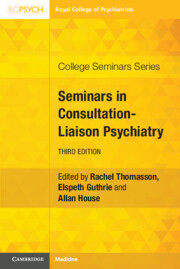Book contents
- Seminars in Consultation-Liaison Psychiatry
- College Seminars Series
- Seminars in Consultation-Liaison Psychiatry
- Copyright page
- Contents
- Contributors
- Chapter 1 The Assessment Process in Consultation-Liaison Psychiatry
- Chapter 2 Notes on Training Pathways in Consultation-Liaison Psychiatry
- Chapter 3 Nursing in Consultation-Liaison Settings
- Chapter 4 Psychological Reaction to Physical Illness
- Chapter 5 Self-Harm and Suicidal Thoughts
- Chapter 6 Depression in Medical Settings
- Chapter 7 Functional Somatic Symptoms
- Chapter 8 Alcohol Misuse
- Chapter 9 Substance Misuse
- Chapter 10 Psychosis in General Hospital Settings
- Chapter 11 Acute Behavioural Disturbance in the General Hospital
- Chapter 12 The Neurology–Psychiatry Interface
- Chapter 13 Perinatal Psychiatry
- Chapter 14 Paediatric Consultation-Liaison Psychiatry
- Chapter 15 Psychological Treatment
- Chapter 16 Legal and Ethical Issues in Consultation-Liaison Psychiatry
- Chapter 17 Social Aspects of Consultation-Liaison Psychiatry
- Chapter 18 Education for Acute Hospital Staff
- Chapter 19 Considerations in the Planning and Delivery of Consultation-Liaison Psychiatry Services
- Chapter 20 Outcome Measurement in Consultation-Liaison Psychiatry
- Chapter 21 The Evidence Base for Consultation-Liaison Psychiatry
- Chapter 22 Primary Care Consultation-Liaison Services
- Chapter 23 Emergency Department Psychiatry
- Chapter 24 Setting Standards for Consultation-Liaison Psychiatry Services
- Chapter 25 Policy to Practice
- Chapter 26 Consultation-Liaison Psychiatry
- Index
- References
Chapter 18 - Education for Acute Hospital Staff
Published online by Cambridge University Press: 04 January 2024
- Seminars in Consultation-Liaison Psychiatry
- College Seminars Series
- Seminars in Consultation-Liaison Psychiatry
- Copyright page
- Contents
- Contributors
- Chapter 1 The Assessment Process in Consultation-Liaison Psychiatry
- Chapter 2 Notes on Training Pathways in Consultation-Liaison Psychiatry
- Chapter 3 Nursing in Consultation-Liaison Settings
- Chapter 4 Psychological Reaction to Physical Illness
- Chapter 5 Self-Harm and Suicidal Thoughts
- Chapter 6 Depression in Medical Settings
- Chapter 7 Functional Somatic Symptoms
- Chapter 8 Alcohol Misuse
- Chapter 9 Substance Misuse
- Chapter 10 Psychosis in General Hospital Settings
- Chapter 11 Acute Behavioural Disturbance in the General Hospital
- Chapter 12 The Neurology–Psychiatry Interface
- Chapter 13 Perinatal Psychiatry
- Chapter 14 Paediatric Consultation-Liaison Psychiatry
- Chapter 15 Psychological Treatment
- Chapter 16 Legal and Ethical Issues in Consultation-Liaison Psychiatry
- Chapter 17 Social Aspects of Consultation-Liaison Psychiatry
- Chapter 18 Education for Acute Hospital Staff
- Chapter 19 Considerations in the Planning and Delivery of Consultation-Liaison Psychiatry Services
- Chapter 20 Outcome Measurement in Consultation-Liaison Psychiatry
- Chapter 21 The Evidence Base for Consultation-Liaison Psychiatry
- Chapter 22 Primary Care Consultation-Liaison Services
- Chapter 23 Emergency Department Psychiatry
- Chapter 24 Setting Standards for Consultation-Liaison Psychiatry Services
- Chapter 25 Policy to Practice
- Chapter 26 Consultation-Liaison Psychiatry
- Index
- References
Summary
Liaison psychiatry operates across psychiatry, medical and surgical settings and, in some departments, primary care. There are a myriad of interfaces and interactions on an almost daily basis with others who potentially know little about the interesting and stimulating academic areas within it and its potential benefits to patients and staff.
The interface between mental and physical health is all too frequently one of ‘oil and water’ and perhaps one function of the liaison psychiatrist can be seen as acting as the emulsifier between these two substances. The emulsifying agent proposed here is that of education and training.
- Type
- Chapter
- Information
- Seminars in Consultation-Liaison Psychiatry , pp. 301 - 317Publisher: Cambridge University PressPrint publication year: 2024



